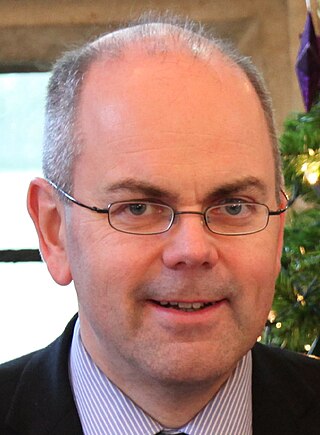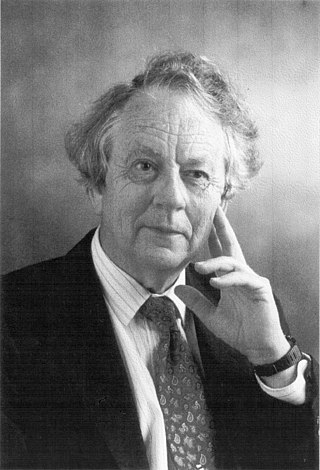Philip W. J. Stopford (born 1977) is an English organist and composer best known for his choral works. [1]
Contents

Philip W. J. Stopford (born 1977) is an English organist and composer best known for his choral works. [1]

Stopford began his musical career as a chorister at Westminster Abbey from 1986 to 1990, during which time he also took up the piano, organ and violin. He was awarded a music scholarship to Bedford School, [2] which he attended from 1990 to 1995. [3]
Later he studied for a Bachelor of Arts in music at the University of Oxford, where from 1996 to 1999 he also served as organ scholar at Keble College. [1] [4]
From 1995 to 1996 Stopford was organ scholar at Truro Cathedral, where he worked under Andrew Nethsingha and published his first choral works. After university he was organ scholar at Canterbury Cathedral from 1999 to 2000 before becoming Assistant Organist at Chester Cathedral.
In 2003 he moved to Northern Ireland, where he served as Director of Music at St Anne's Cathedral in Belfast until the post was closed in 2010.
For the next few years Stopford pursued a career as a composer and conductor before being appointed Director of Music at Christ Church in Bronxville, New York, in 2016, having spent part of the previous year there as composer-in-residence. [1]
In 2021 he returned to the United Kingdom, [1] where he currently serves as President of the Leighton Buzzard Festival Singers. [5]
Stopford is known for his contemporary a cappella and accompanied settings of traditional Latin and English prayers and hymns, including "Ave Verum Corpus", titled "Ave Verum"; "Lullay, My Liking"; the Coventry Carol, titled "Lully, Lulla, Lullay"; and "In My Father's House". Three of Stopford's works appeared in the Classic FM Hall of Fame in 2014, [6] after he made his first appearance on the chart in 2013. [7]
He has composed numerous other works, including a Te Deum, a Latin Mass titled "Missa Deus Nobiscum" and various Latin canticles. Missa Deus Nobiscum was commissioned to celebrate the 150th anniversary of Methodist College Belfast; its first performance was in the Waterfront Hall, Belfast, on 14 March 2019. [8]
Stopford also serves as director of the professional choir Ecclesium, which has released many CDs of his works.

Herbert Norman Howells was an English composer, organist, and teacher, most famous for his large output of Anglican church music.
Ave verum corpus is a short Eucharistic chant that has been set to music by many composers. It dates to the 13th century, first recorded in a central Italian Franciscan manuscript. A Reichenau manuscript of the 14th century attributes it to Pope Innocent

James Healey Willan was an English and Canadian organist and composer. He composed more than 800 works including operas, symphonies, chamber music, a concerto, and pieces for band, orchestra, organ, and piano. He is best known for his church music.

Samuel Wesley was an English organist and composer in the late Georgian period. Wesley was a contemporary of Mozart (1756–1791) and was called by some "the English Mozart".
(James) Frederick Stocken is a British classical composer, organist and musicologist.

Bernard William George Rose was a British organist, soldier, composer, and academic.
Francisco López Capillas, known also as "López of the Chapels," was a Mexican composer and theologian born in Mexico City. He is considered one of the most prolific composers of sacred music in Mexico during the Baroque era.
David John Briggs is an English organist and composer.
Sir Richard Runciman Terry was an English organist, choir director, composer and musicologist. He is noted for his pioneering revival of Tudor liturgical music.
Malcolm Archer is an English composer, conductor and organist. He was formerly Organist and Director of Music at Bristol Cathedral, at Wells Cathedral and at St Paul's Cathedral and Director of Chapel Music at Winchester College.

Belfast Cathedral, also known as St Anne's Cathedral, is an Anglican cathedral in Donegall Street, Belfast, Northern Ireland. It is unusual in serving two separate dioceses. It is the focal point of Belfast's Cathedral Quarter.
Diana Elizabeth Jane Burrell is an English composer and viola player.

Peter Anthony Togni is a freelancer Canadian composer and broadcaster based in Halifax, Nova Scotia.

Kenneth Leighton was a British composer and pianist. His compositions include church and choral music, pieces for piano, organ, cello, oboe and other instruments, chamber music, concertos, symphonies, and an opera. He had various academic appointments in the Universities of Leeds, Oxford and, primarily, Edinburgh.
Rupert Edward Elessing Jeffcoat is a Scottish organist, composer and Anglican priest.
Nicholas O'Neill is an English composer, arranger, organist and choral director.

Christopher Tambling was a British composer, organist and choirmaster. From 1997 to 2015 he was Director of Music at Downside School and organist and Choirmaster of the Schola Cantorum at Downside Abbey, leading the choir to international success.
Ronny Krippner is a German-born British organist, conductor, teacher and composer who currently serves as Director of Music at Ripon Cathedral.

Gerald Mills Hendrie,, is an English scholar, composer, organist, pianist and harpsichordist.
William Fox is an English organist, currently Director of Music at St Albans Cathedral.